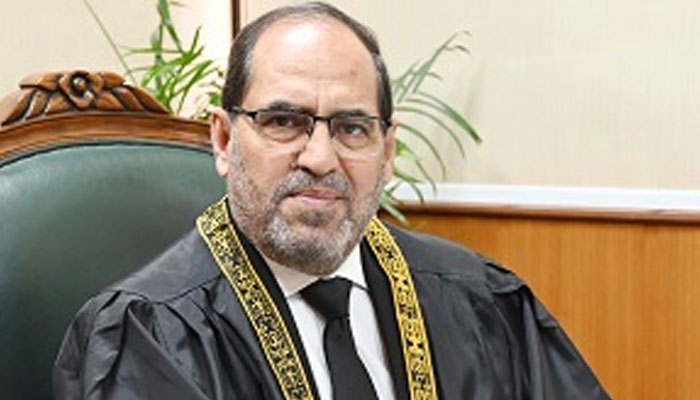Justice Afghan questions transfer of judge, bypassing seniors
Justice Afghan asks whether, under Article 200 of Constitution, transfer of judge is permanent or temporary
ISLAMABAD: Justice Naeem Akhtar Afghan of the Supreme Court on Wednesday questioned the transfer of the 15th-ranked judge, bypassing senior judges.
A five-member constitutional bench of the apex court, headed by Justice Muhammad Ali Mazhar, heard petitions of five judges of the Islamabad High Court (IHC) against transfer of judges to the said high court and the formation of a new seniority list based on those transfers.
Advocate General Punjab Amjad Pervez presented arguments on the historical and constitutional context of judges’ transfers. He informed the court that in 1955, under an order by the Governor-General, West Pakistan was made into a single unit, and all high courts were merged into one. He submitted that at that time, the judges’ previous service was recognized, and seniority was determined according to the date of appointment. He further explained that when the One Unit was dissolved in 1970, judges were transferred to different high courts, and their previous service was also acknowledged. Similarly, he submitted that when the Sindh and Balochistan High Courts were separated in 1976, the seniority of judges was maintained during the transfers.
Justice Naeem Akhtar Afghan observed that the current case is different because no new court has been formed, nor has any high court been dissolved. Therefore, past precedents may not be applicable, Justice Afghan remarked.
Advocate General Punjab reiterated that historically, whenever judges were transferred, their previous service was recognized. He also referred to the high treason case against Gen (retd) Pervez Musharraf, stating that a special court was formed with judges from five high courts, and the most senior among them was appointed as the head, which indicates that seniority has always been prioritized.
Justice Afghan asked whether, under Article 200 of the Constitution, the transfer of a judge is permanent or temporary, pointing out that the attorney general had himself termed the transfer permanent, and further clarification is required. The advocate general responded that he would also argue about the duration of a transfer and the constitutional powers of the President in this regard. Justice Afghan questioned “the rationale behind transferring the 15th-ranked judge while overlooking 14 more senior judges.” The advocate general replied that the summary was not prepared by just anyone, but by the judges themselves, who are well-versed in the Constitution and law.
Justice Shakeel Ahmed tried to distinguish between the terms “Such Period” and “During the Period.” The Advocate General explained that “Such Period” refers to a specific duration, while During the Period” implies permanence. Justice Shakeel Ahmed noted that the transfer summary did not mention “public interest” anywhere. The Advocate General responded that the term public interest is also not used in Article 200 of the Constitution.
After the Advocate General’s arguments, former PTI Chairman Imran Khan’s lawyer, Idrees Ashraf, began his arguments. When asked how much time he needed, he said 15 minutes, which was also the time estimated by the Attorney General.
Meanwhile, the court adjourned until today (Thursday) wherein, Idrees Ashraf’s arguments will continue, after which the Attorney General will conclude his submissions in rebuttal.
-
 Everything We Know About Jessie J's Breast Cancer Journey
Everything We Know About Jessie J's Breast Cancer Journey -
 Winter Olympics 2026: What To Watch In Men’s Hockey Today
Winter Olympics 2026: What To Watch In Men’s Hockey Today -
 Winnie Harlow Breaks Vitiligo Stereotypes: 'I'm Not A Sufferer'
Winnie Harlow Breaks Vitiligo Stereotypes: 'I'm Not A Sufferer' -
 Apple Martin Opens Up About Getting 'crazy' Lip Filler
Apple Martin Opens Up About Getting 'crazy' Lip Filler -
 Why Did OpenAI Remove One Crucial Word From Its Mission Statement?
Why Did OpenAI Remove One Crucial Word From Its Mission Statement? -
 Prince William Warned His Future Reign Will Be Affected By Andrew Scandal
Prince William Warned His Future Reign Will Be Affected By Andrew Scandal -
 Amy Madigan Reflects On Husband Ed Harris' Support After Oscar Nomination
Amy Madigan Reflects On Husband Ed Harris' Support After Oscar Nomination -
 Is Studying Medicine Useless? Elon Musk’s Claim That AI Will Outperform Surgeons Sparks Debate
Is Studying Medicine Useless? Elon Musk’s Claim That AI Will Outperform Surgeons Sparks Debate -
 Margot Robbie Gushes Over 'Wuthering Heights' Director: 'I'd Follow Her Anywhere'
Margot Robbie Gushes Over 'Wuthering Heights' Director: 'I'd Follow Her Anywhere' -
 'The Muppet Show' Star Miss Piggy Gives Fans THIS Advice
'The Muppet Show' Star Miss Piggy Gives Fans THIS Advice -
 Sarah Ferguson Concerned For Princess Eugenie, Beatrice Amid Epstein Scandal
Sarah Ferguson Concerned For Princess Eugenie, Beatrice Amid Epstein Scandal -
 Uber Enters Seven New European Markets In Major Food-delivery Expansion
Uber Enters Seven New European Markets In Major Food-delivery Expansion -
 Hollywood Fights Back Against Super-realistic AI Video Tool
Hollywood Fights Back Against Super-realistic AI Video Tool -
 Meghan Markle's Father Shares Fresh Health Update
Meghan Markle's Father Shares Fresh Health Update -
 Pentagon Threatens To Cut Ties With Anthropic Over AI Safeguards Dispute
Pentagon Threatens To Cut Ties With Anthropic Over AI Safeguards Dispute -
 Samsung Galaxy Unpacked 2026: What To Expect On February 25
Samsung Galaxy Unpacked 2026: What To Expect On February 25




